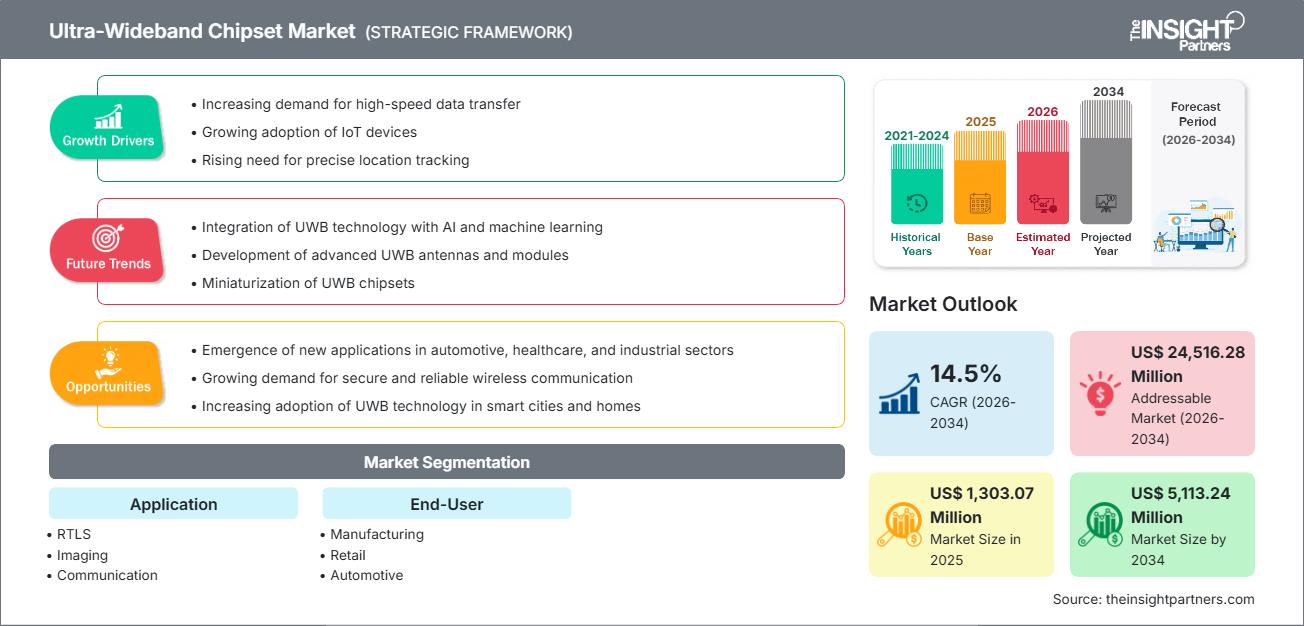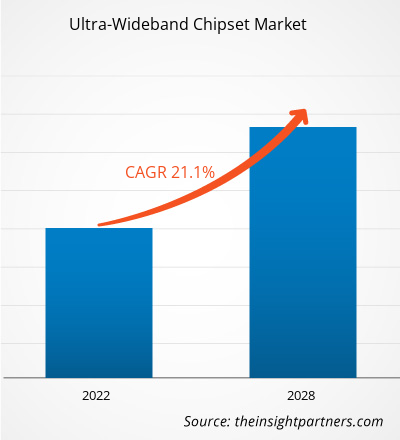Ultra-Wideband Chipset Market Size, Share & Insights 2034
Historic Data: 2021-2024 | Base Year: 2025 | Forecast Period: 2026-2034Coverage: Ultra-Wideband Chipset Market covers analysis By Application (RTLS, Imaging, and Communication) and End-User (Manufacturing, Retail, Automotive, Healthcare, and Consumer Electronics)
- Report Date : Mar 2026
- Report Code : TIPRE00019465
- Category : Electronics and Semiconductor
- Status : Upcoming
- Available Report Formats :


- No. of Pages : 150
The ultra‑wideband chipset market size was valued at US$1,303.07 Million in 2025 and is expected to reach UUS$5,113.24Million in 2034, growing at a CAGR of 14.5% from 2026 to 2034.
Ultra‑Wideband Chipset Market Analysis
The ultra‑wideband (UWB) chipset market is forecast to grow strongly, owing to rising adoption of UWB technology in real‑time location systems (RTLS), demand for high‑accuracy asset tracking, and integration of UWB in consumer and industrial devices.
UWB technology offers higher accuracy, broader bandwidth, lower power consumption, nd better interference resistance compared to legacy RTLS approaches (e.g., RFID, Wi‑Fi-based positioning), which makes it attractive for applications requiring precise indoor/outdoor positioning and secure communication.
Furthermore, growth in IoT, smart devices, wearable electronics, automotive applications (e.g, secure access, vehicle localization), and industrial automation – all of which benefit from UWB chipsets – is fueling demand.
Ultra‑Wideband Chipset Market Overview
Ultra‑wideband chipsets are integrated circuits that enable UWB communication, a wireless technology that uses a wide frequency spectrum for short-range, high-precision, low‑power data transmission and ranging. These chipsets are fundamental to enabling precise real-time location systems (RTLS), secure access control, device-to-device communication, and other use cases in consumer electronics, automotive, industrial, healthcare, and retail sectors.
By enabling centimeter‑level localization accuracy, low latency, resistance to interference, and energy-efficient communications, UWB chipsets help device manufacturers and system integrators deliver robust performance, whether for tracking assets in a warehouse, enabling smartphone spatial awareness, or providing secure keyless entry in automobiles.
As demand for precise positioning, real-time tracking, and secure communication continues to rise, UWB chipsets are emerging as a critical infrastructure component across multiple verticals.
Customize This Report To Suit Your Requirement
You will get customization on any report - free of charge - including parts of this report, or country-level analysis, Excel Data pack, as well as avail great offers and discounts for start-ups & universities
Ultra-Wideband Chipset Market: Strategic Insights

-
Get Top Key Market Trends of this report.This FREE sample will include data analysis, ranging from market trends to estimates and forecasts.
Ultra‑Wideband Chipset Market Drivers and Opportunities
Market Drivers:
- High‑precision location and tracking needs: The demand for accurate real‑time location systems (RTLS) in manufacturing, logistics, retail, healthcare, and smart infrastructure is increasing, boosting adoption of UWB over less accurate alternatives.
- Growing integration in consumer electronics & smart devices: As smartphones, wearables, smart home devices, and IoT gadgets proliferate, UWB chipsets are increasingly embedded to enable spatial awareness, secure communication, and proximity-based features.
- Rising automotive applications: UWB is being leveraged for secure car entry, localization, and communication features, contributing to increased chipset demand from auto manufacturers.
- Demand for low‑power, interference‑resistant communication: UWB’s inherent advantages, low latency, robust against multipath/interference, and energy-efficiency, make it suitable for modern wireless systems needing reliability and precision.
Market Opportunities:
- Expansion across industries and emerging technology use-cases: With growing demand in logistics, smart manufacturing, healthcare asset tracking, retail inventory management, and smart home/office automation, UWB chipset adoption is expected to broaden.
- IoT and smart‑device proliferation: As IoT ecosystems expand globally, embedding UWB chipsets into more devices offers considerable growth potential, including in wearables, smart tags, and device‑to‑device communication.
- Automotive & mobility innovations: UWB’s use in vehicle access, secure communication, and localization suggests major opportunities for chipset vendors partnering with automotive OEMs.
- Migration from legacy tracking/communication technologies: As enterprises and consumers demand better accuracy and security, UWB presents itself as a replacement for older systems (e.g., RFID, basic Bluetooth), driving chipset uptake.
Ultra‑Wideband Chipset Market Segmentation Analysis
By Application:
- Real-Time Location Systems (RTLS)
- Imaging
- Communication
By End‑User / Industry Vertical:
- Manufacturing
- Retail
- Automotive
- Healthcare
- Consumer Electronics
By Geography:
- North America
- Europe
- Asia Pacific
- South & Central America
- Middle East & Africa
Ultra-Wideband Chipset Market Regional Insights
The regional trends and factors influencing the Ultra-Wideband Chipset Market throughout the forecast period have been thoroughly explained by the analysts at The Insight Partners. This section also discusses Ultra-Wideband Chipset Market segments and geography across North America, Europe, Asia Pacific, Middle East and Africa, and South and Central America.
Ultra-Wideband Chipset Market Report Scope
| Report Attribute | Details |
|---|---|
| Market size in 2025 | US$ 1,303.07 Million |
| Market Size by 2034 | US$ 5,113.24 Million |
| Global CAGR (2026 - 2034) | 14.5% |
| Historical Data | 2021-2024 |
| Forecast period | 2026-2034 |
| Segments Covered |
By Application
|
| Regions and Countries Covered |
North America
|
| Market leaders and key company profiles |
|
Ultra-Wideband Chipset Market Players Density: Understanding Its Impact on Business Dynamics
The Ultra-Wideband Chipset Market is growing rapidly, driven by increasing end-user demand due to factors such as evolving consumer preferences, technological advancements, and greater awareness of the product's benefits. As demand rises, businesses are expanding their offerings, innovating to meet consumer needs, and capitalizing on emerging trends, which further fuels market growth.

- Get the Ultra-Wideband Chipset Market top key players overview
Ultra‑Wideband Chipset Market Share Analysis by Geography
According to the report by The Insight Partners, in 2021, the market’s regional presence covered North America, Europe, Asia-Pacific, Latin America, the Middle East, and Africa.
Historically, the Asia‑Pacific has held a substantial revenue share (leading among regions), followed by North America and Europe.
The growth across regions is expected to vary depending on technology adoption rates, industrialization, consumer electronics penetration, automotive integration, and IoT infrastructure development, offering particular potential in the Asia-Pacific and emerging economies.
Competitive Landscape & Players Density
The presence of multiple global players and niche chipset developers characterizes the Ultra‑Wideband Chipset Market. These vendors differentiate via:
- Integration of UWB chipsets into versatile ICs for consumer devices and IoT.
- Advanced chipset design optimizing power, bandwidth, and interference resistance.
- Strategic collaborations with device manufacturers (smartphones, automotive OEMs, industrial equipment makers) to embed UWB in next‑gen products.
- Innovation aimed at tailoring UWB for RTLS, communication, and imaging applications across diverse verticals.
Major Companies Operating in the Ultra‑Wideband Chipset Market
- ALEREON, Inc.
- Apple Inc.
- Bespoon SAS
- Decawave Limited
- TAIYO YUDEN CO., LTD.
- Johanson Technology, Inc.
- NOVELDA AS
- NXP Semiconductors N.V.
- Pulse-Link, Inc.
Other players analyzed during the course of research are:
- Texas Instruments Incorporated
- STMicroelectronics N.V.
- Samsung Electronics Co., Ltd.
- Zebra Technologies Corporation
- Sony Corporation
- Infineon Technologies AG
- Murata Manufacturing Co., Ltd.
- LitePoint Corporation
- Sewio Networks s.r.o.
- Nanotron Technologies GmbH
Ultra‑Wideband Chipset Market News and Recent Developments
- The global report by The Insight Partners reaffirms strong growth, with the UWB chipset market projected to reach US$1,906.46 million by 2028.
- Growing deployment of UWB in RTLS, consumer devices, and automotive sectors is identified as a key growth driver due to UWB's higher accuracy and capability to replace legacy tracking/communication systems.
Ultra‑Wideband Chipset Market Report Coverage and Deliverables
The “Ultra‑Wideband Chipset Market Size and Forecast (2021–2034)” report from The Insight Partners offers:
- Detailed market size & forecast at global, regional, and country levels for key segments.
- Analysis of market trends, growth drivers, opportunities, and underlying market dynamics.
- Segmentation by application, end‑user, and geography.
- Competitive landscape & company profiling for leading chipset vendors.
Frequently Asked Questions
What are the market size dynamics of the global ultra‑wideband chipset market?
What are the primary applications driving UWB chipset demand?
Which industries are the main end-users of UWB chipsets?
What are some challenges or restraints for growth?
Who are some leading companies in this market?
Naveen is an experienced market research and consulting professional with over 9 years of expertise across custom, syndicated, and consulting projects. Currently serving as Associate Vice President, he has successfully managed stakeholders across the project value chain and has authored over 100 research reports and 30+ consulting assignments. His work spans across industrial and government projects, contributing significantly to client success and data-driven decision-making.
Naveen holds an Engineering degree in Electronics & Communication from VTU, Karnataka, and an MBA in Marketing & Operations from Manipal University. He has been an active IEEE member for 9 years, participating in conferences, technical symposiums, and volunteering at both section and regional levels. Prior to his current role, he worked as an Associate Strategic Consultant at IndustryARC and as an Industrial Server Consultant at Hewlett Packard (HP Global).
- Historical Analysis (2 Years), Base Year, Forecast (7 Years) with CAGR
- PEST and SWOT Analysis
- Market Size Value / Volume - Global, Regional, Country
- Industry and Competitive Landscape
- Excel Dataset
Recent Reports
Testimonials
The Insight Partners' SCADA System Market report is comprehensive, with valuable insights on current trends and future forecasts. The team was highly professional, responsive, and supportive throughout. We are very satisfied and highly recommend their services.
RAN KEDEM Partner, Reali Technologies LTDsI requested a report on a very specific software market and the team produced the report in a few days. The information was very relevant and well presented. I then requested some changes and additions to the report. The team was again very responsive and I got the final report in less than a week.
JEAN-HERVE JENN Chairman, Future AnalyticaWe worked with The Insight Partners for an important market study and forecast. They gave us clear insights into opportunities and risks, which helped shape our plans. Their research was easy to use and based on solid data. It helped us make smart, confident decisions. We highly recommend them.
PIYUSH NAGPAL Sr. Vice President, High Beam GlobalThe Insight Partners delivered insightful, well-structured market research with strong domain expertise. Their team was professional and responsive throughout. The user-friendly website made accessing industry reports seamless. We highly recommend them for reliable, high-quality research services
YUKIHIKO ADACHI CEO, Deep Blue, LLC.This is the first time I have purchased a market report from The Insight Partners.While I was unsure at first, I visited their web site and felt more comfortable to take the risk and purchase a market report.I am completely satisfied with the quality of the report and customer service. I had several questions and comments with the initial report, but after a couple of dialogs over email with their analyst I believe I have a report that I can use as input to our strategic planning process.Thank you so much for taking the extra time and making this a positive experience.I will definitely recommend your service to others and you will be my first call when we need further market data.
JOHN SUZUKI President and Chief Executive Officer, Board Director, BK TechnologiesI wish to appreciate your support and the professionalism you displayed in the course of attending to my request for information regarding to infectious disease IVD market in Nigeria. I appreciate your patience, your guidance, and the fact that you were willing to offer a discount, which eventually made it possible for us to close a deal. I look forward to engaging The Insight Partners in the future, all thanks to the impression you have created in me as a result of this first encounter.
DR CHIJIOKE ONYIA MANAGING DIRECTOR, PineCrest Healthcare Ltd.Reason to Buy
- Informed Decision-Making
- Understanding Market Dynamics
- Competitive Analysis
- Identifying Emerging Markets
- Customer Insights
- Market Forecasts
- Risk Mitigation
- Boosting Operational Efficiency
- Strategic Planning
- Investment Justification
- Tracking Industry Innovations
- Aligning with Regulatory Trends




















 Get Free Sample For
Get Free Sample For